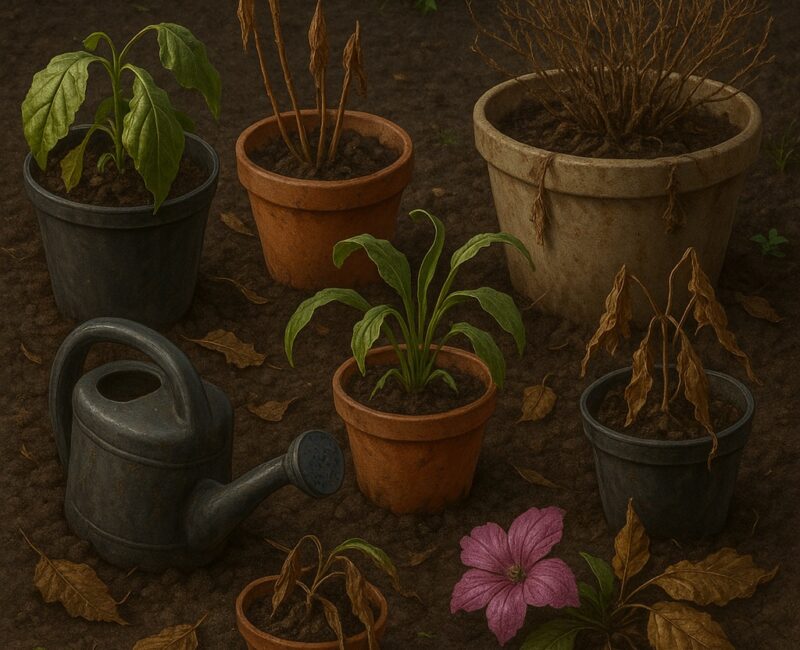Why Your Plants May Be Struggling Without You Realizing
There’s nothing more frustrating than nurturing your garden, only to watch plants slowly fade away. The truth is, many common gardening mistakes aren’t obvious at first. Instead, they silently weaken your plants until they can no longer recover.
Recognizing these mistakes early can mean the difference between a thriving, green paradise and a garden filled with struggling, yellowing leaves.
Signs Your Plants Are Dying Slowly
Before diving into the mistakes, it’s important to recognize warning signs:
- Yellow or curling leaves
- Wilting even with watering
- Stunted growth
- Brown tips or edges
- Poor flowering or fruiting
These symptoms often signal deeper issues that many gardeners overlook.
Read more – Urban Gardening Tips: Maximize Small Spaces with Creativity
Common Gardening Mistakes That Go Unnoticed
Overwatering: The Silent Root Killer
Too much water suffocates roots, leading to root rot. The plant may look healthy at first, but over time, it starts to yellow and collapse.
Fix: Check soil moisture before watering—if the top inch is dry, it’s safe to water.
Underwatering: Starving Your Plants Without Knowing
On the flip side, too little water leaves plants dehydrated. Leaves become crispy, growth slows, and flowers may drop.
Fix: Water deeply but less frequently to encourage strong root systems.
Planting in the Wrong Soil
Each plant has unique soil needs. For example, succulents require sandy, well-drained soil, while vegetables prefer nutrient-rich loam.
Fix: Research your plant’s ideal soil type and amend with compost or sand as needed.
Ignoring Sunlight Requirements
Some plants thrive in full sun, while others burn easily. Putting shade-loving plants in direct light leads to leaf scorch.
Fix: Check plant tags or guides to ensure proper placement.
Using the Wrong Fertilizer or Too Much of It
Excess fertilizer can burn roots and disrupt nutrient balance. Conversely, lack of nutrients starves plants.
Fix: Use the right fertilizer at recommended intervals, and avoid overfeeding.
Crowding Plants Too Closely Together
When plants are packed tightly, they compete for nutrients, water, and light. This also increases the risk of fungal diseases.
Fix: Follow spacing guidelines on seed packets and give each plant breathing room.
Neglecting Proper Pruning
Dead or overgrown branches steal energy from healthy growth.
Fix: Prune regularly to remove dead leaves, encourage airflow, and shape plants.
Ignoring Pests and Diseases Until It’s Too Late
A few aphids or fungal spots may not seem serious, but they spread quickly.
Fix: Inspect plants weekly and treat issues early with natural remedies or organic sprays.
Using Tap Water That’s Too Harsh
In some regions, tap water contains too much chlorine or fluoride, which harms sensitive plants.
Fix: Collect rainwater or let tap water sit overnight before using.
Advanced Gardening Mistakes Experienced Gardeners Still Make
Failing to Rotate Crops
Planting the same vegetables in the same spot every year depletes soil and invites pests.
Fix: Rotate crops seasonally to maintain soil health.
Planting at the Wrong Season
Even the healthiest plant will fail if planted out of season.
Fix: Follow a planting calendar suited to your region’s climate.
Neglecting Soil pH Balance
Some plants require acidic soil (like blueberries), while others prefer alkaline. Ignoring pH can prevent nutrient absorption.
Fix: Test soil pH and adjust with lime (to raise) or sulfur (to lower).
How to Identify and Fix These Gardening Mistakes
Testing Soil Before Planting
A simple soil test reveals nutrient levels and pH balance, helping you avoid guesswork.
Creating a Consistent Watering Schedule
Use a drip irrigation system or water deeply in the mornings for best results.
Matching Plants to the Right Location
Group plants by sunlight and moisture needs for easier care.
Natural Pest & Disease Prevention
Encourage beneficial insects, use neem oil, and rotate crops to minimize issues.
Expert Tips to Keep Plants Thriving
Companion Planting for Healthier Gardens
Pairing basil with tomatoes or marigolds with peppers repels pests naturally.
Mulching for Moisture and Weed Control
Mulch locks in soil moisture, keeps roots cool, and reduces weed growth.
When to Repot and Refresh Soil
Indoor plants especially benefit from repotting every 1–2 years with fresh soil to boost nutrients.
Conclusion: Avoid These Silent Plant Killers
Many gardeners unintentionally sabotage their own plants by overlooking small details. From overwatering and poor soil choices to ignoring sunlight and pests, these secret mistakes slowly drain the life from your garden.
By recognizing and correcting these issues early, you’ll enjoy healthier, more vibrant plants that thrive season after season. Remember: a little knowledge goes a long way in keeping your garden lush, green, and full of life. 🌱





